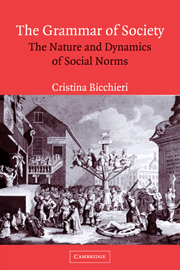1 - The Rules We Live By
Published online by Cambridge University Press: 05 June 2012
Summary
Introduction
Despite the ubiquitous reference to the concept of social norms in the social sciences, there is no consensus about the power of social norms to direct human action. For some, norms have a central and regular influence on human behavior, while for others, the concept is too vague, and the evidence we have about norm compliance is too contradictory to support the claim that they appreciably affect behavior. Those who doubt that norms have a behavior-guiding force argue that human behavior only occasionally conforms with the dominant social norms. If the same norms are in place when behavior is norm-consistent as when it is norm inconsistent, why should we believe that norms mediated any of it?
Much of the discussion about the power norms have to affect behavior arises from a confusion about what is meant by ‘norm.’ A norm can be formal or informal, personal or collective, descriptive of what most people do, or prescriptive of behavior. In the same social setting, conformity to these different kinds of norms stems from a variety of motivations and produces distinct, sometimes even opposing, behavioral patterns. Take for example a culture in which many individuals have strong personal norms that prohibit corrupt practices and in which there are legal norms against bribing public officers, yet bribing is widespread and tolerated. Suppose we were able to independently assess whether an individual has a personal norm against corruption.
- Type
- Chapter
- Information
- The Grammar of SocietyThe Nature and Dynamics of Social Norms, pp. 1 - 54Publisher: Cambridge University PressPrint publication year: 2005
- 3
- Cited by



